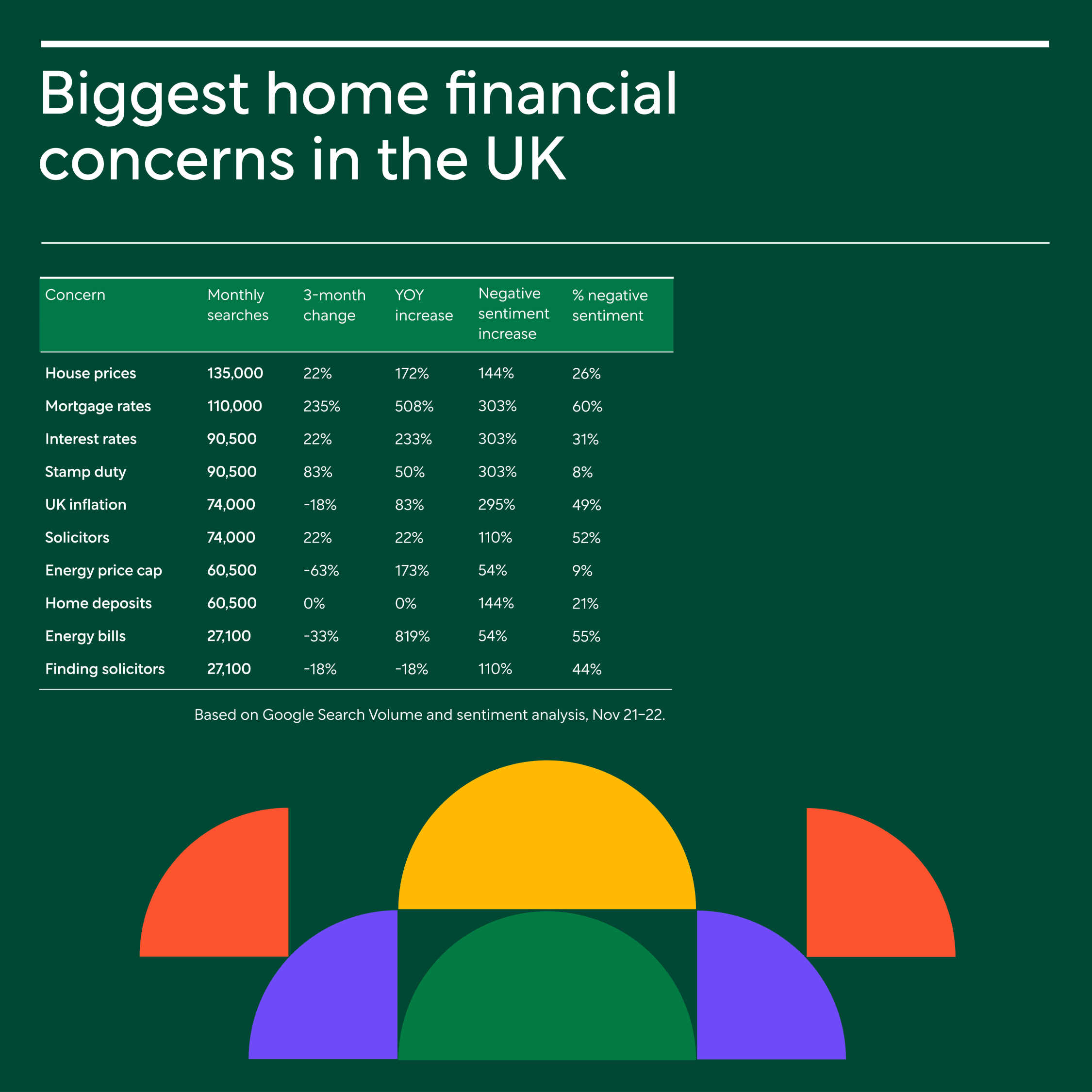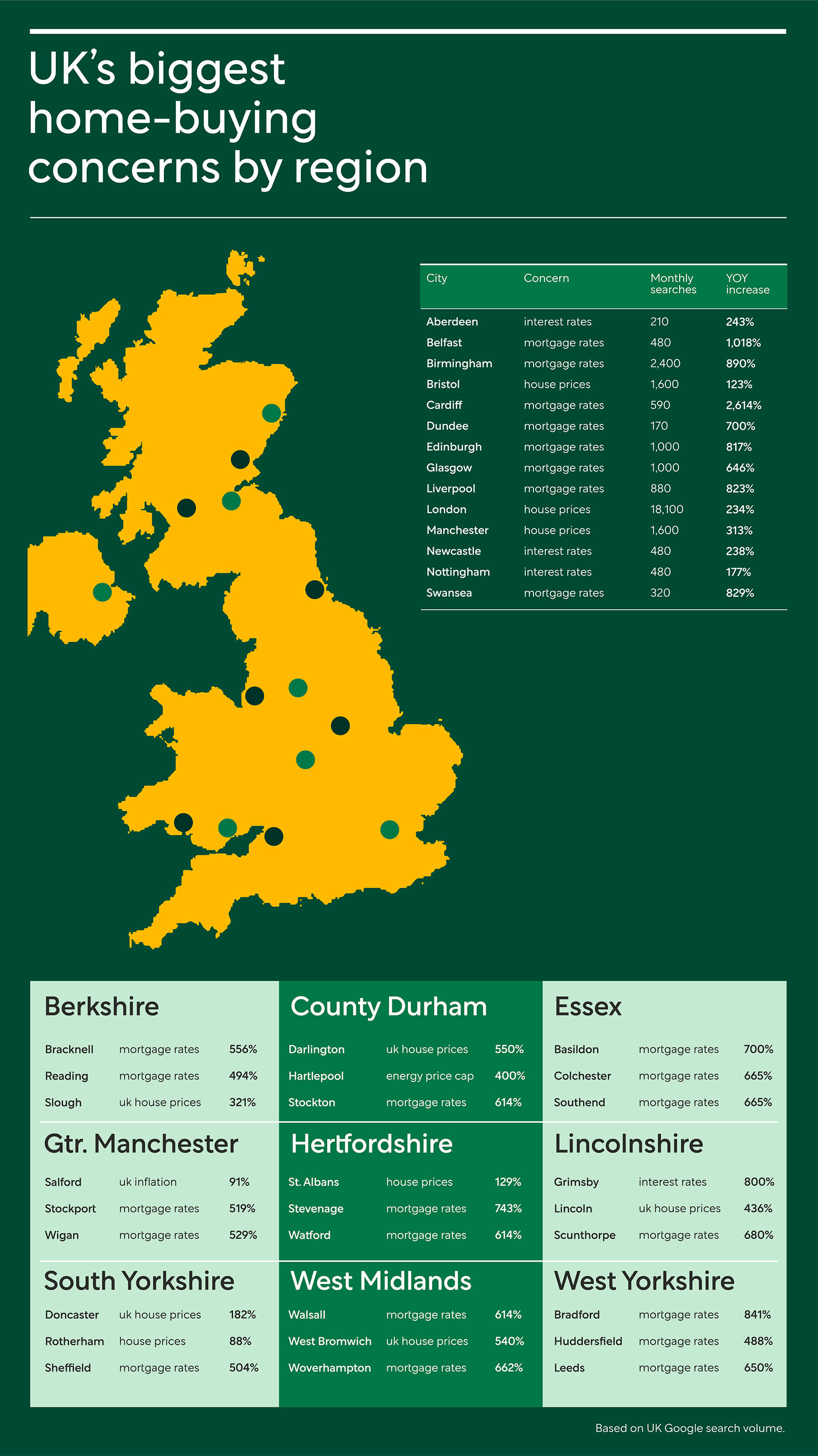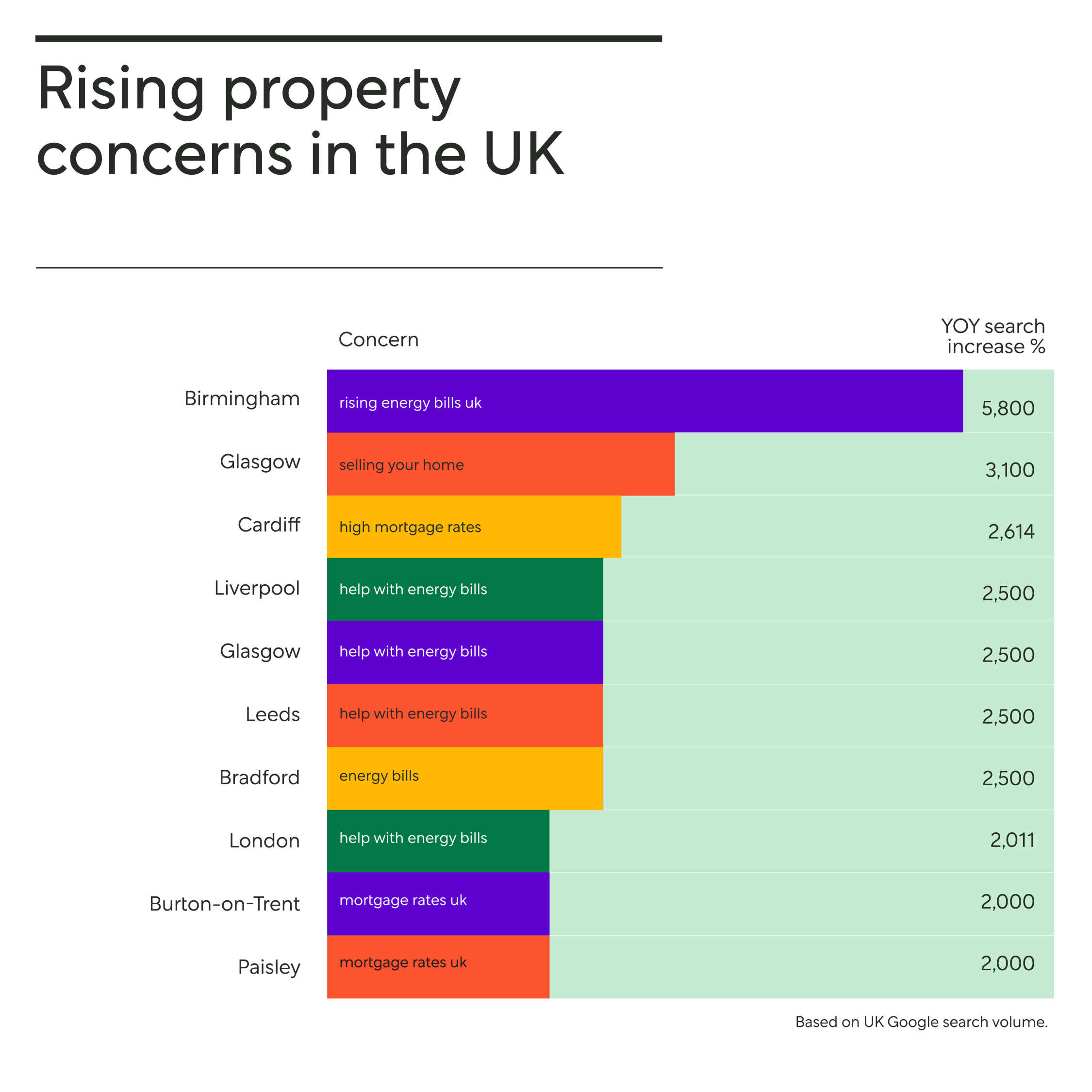The UK's biggest mortgage concerns
Buying a house has always been stressful, but has it become even more so over the last few years?
First, we had the pandemic, and now the cost of living crisis. We’ve seen house prices surge in line with the stamp duty holiday and drop following the recession. In the last year, there’s been a dramatic rise in energy bills followed by fluctuating interest rates after September’s mini-budget. All of this adds further stress for people across the UK trying to buy a home.
At Better.co.uk, we found out exactly which mortgage concerns are keeping Brits awake at night. By answering the most frequently asked mortgage questions around these concerns, our aim is to alleviate as much worry as possible by providing you with actionable takeaway insights.
Executive summary
House prices, mortgage rates and interest rates are the top three mortgage concerns across the UK according to average monthly search volume
Searches around mortgage rates have increased by 508% in a 12-month period – with 31% of these searches featuring negative sentiment
55% of all searches around energy bills are negative
House prices are the most searched-for mortgage concern in London with 18100 average monthly searches
Birmingham has seen a year-on-year increase of 5800% in searches around energy bills
The biggest rising mortgage concern in Glasgow is selling your home (3100% year-on-year search increase)
Mortgage rates are the top rising concern in Cardiff – with a yearly increase of 2614%
The top 10 UK mortgage concerns
By analysing how people use Google to gather information about mortgages and the property market, we can reveal the most-searched-for mortgage topics across the UK from November 2021 to October 2022.
This is what we found:

Key insights
House prices have seen a 172% increase in searches over the past two years, with 26% of those featuring negative sentiment.
Despite this, buyers can take advantage of longer selling times and lower asking prices to get a better deal on their purchase.
Mortgage rates and interest rates are also top concerns for UK citizens, with 508% and 233%, respectively, increases in monthly searches since 2021.
The cost of living crisis is reflected by an 819% rise in energy bill-related searches as well as increased inflationary pressure due to higher energy price caps (60,500 average monthly searches).
The UK’s biggest mortgage concerns by region
Just as house prices vary in the different regions across the UK, so do concerns when it comes to mortgages and buying property. The below map illustrates the top three biggest concerns across each region.

Key insights
Across the UK, mortgage rates are amongst the top three concerns for citizens.
House prices remain a popular topic of search, with 880 monthly searches in Leicester and 18,100 in Greater London.
Mortgage rate searches have seen a significant year-on-year increase; Cardiff saw an average yearly increase of 2614%, Belfast 1018% and Birmingham 890%.
Rising Concerns: Which mortgage concerns are on the rise?
Energy bills remain a hot topic when it comes to rising concerns alongside mortgage rates and the difficulty in selling your home.
Birmingham specifically, has seen the biggest increase in searches around energy bills, with a year-on-year increase of 5800% to 590 average monthly searches. This is followed by selling your home in Glasgow (3100% up to 320) and mortgage rates in Cardiff (2614% up to 190).

So, are these rising concerns having an impact on mortgage applications?
According to Better.co.uk mortgage submission data, only 9% of mortgage applications were submitted in the West Midlands in the last year. This is behind the East of England with 10%, the Northwest with 12%, the South with 15% and London with 18%. Both Scotland (6%) and Wales (4%) are also lagging behind.
Key insights
Rising energy bills have become a major concern for people across the UK, with Birmingham seeing an increase of 5800%.
The EPC rating measures the energy efficiency of your home and is becoming increasingly important when considering which property to buy.
Mortgage lenders are already looking at this EPC rating as a minimum requirement, making it harder to get mortgages on less efficient properties.
When selling your existing property, higher EPC ratings may lead to higher asking prices according to RICS.
Increasing mortgage rates have been impacting people up and down the country, leading them towards fixed-rate mortgages with lower interest rates by putting down larger deposits.
Working with experienced mortgage brokers can help individuals find better deals before any potential market fluctuations impact available options.
FAQs
Answering your biggest mortgage questions: Q&A with Better.co.uk – Based on some of the most asked queries on Google.
Will mortgage rates go down? Why are mortgage rates going up? Should I be worried about mortgage rates?
Mortgage rates are expected to keep increasing in 2023 as the Bank of England attempts to manage inflation by raising the BofE base rate. It’s been speculated that the base rate, currently at 4% could rise as high as 4.8% in Q3 of 2023. Mortgage rates may finally begin to decrease again in 2024.
With mortgage rates on the rise and repayments becoming more costly, buyers should ensure they shop around for the right mortgage deal. Potential buyers should also consider that they put down as big a deposit as possible, as this will increase their access to better mortgage deals with lower interest rates
Who will be most affected by this, i.e. first-time buyers or those at the end of deals?
Those most affected by increasing mortgage rates are:
First-time buyers, as the already hefty cost of a property, is compounded with expensive monthly payments and the cost of living crisis
Those coming to the end of a low fixed term rate; anyone fortunate enough to have locked into a low mortgage rate in the last few years will face the stark difference in interest rates when they go to remortgage.
Anyone on standard variable rate mortgages as mortgage interest rates are subject to change in response to the market and the base rate.
Those with lower household incomes will feel the strain when it comes to higher mortgage rates and repayments. This on top of the cost of living crisis will put financial pressure on households with lower incomes.
Is it a good time to sell because of this?
Rising interest rates will make it more expensive to borrow and difficult to secure an affordable mortgage deal. This may deter many homebuyers from looking to buy in the current market. As mentioned above, it is also expected that house prices will drop, meaning that sellers may not get what they think their home is worth.
Stamp duty costs vary across the UK.
England and Northern Ireland
The standard rate bands for stamp duty are as follows:
0% stamp duty on first £0 - £250,000 of property value
5% stamp duty on next £675,000 of property value (£250,001 to £925,000)
10% stamp duty on next £575,000 of property value (£925,001 to £1.5 million)
12% stamp duty on the remaining amount (above £1.5 million of property value)
Stamp duty for first-time buyers in England and Northern Ireland
First-time buyers won't pay stamp duty on the first £425,000 of their property's value. If a property costs between £425,001 and £625,000, they will have to pay a rate of 5% for the remaining part.
0% stamp duty on first £0 - £425,000 of property value
5% stamp duty on next £200,000 of property value (£425,001 to £625,000)
Normal stamp duty rates on anything over £625,000
Stamp duty in Scotland
Stamp duty in Scotland is called land and buildings transaction tax (LBTT). The following rates apply over the first £145,000:
2% on the value of the property between £145,000 and £250,000
5% on the part between £250,000 and £325,000
10% on the part from £325,000 to £750,000
12% on any value over £750,000
First-time buyers in Scotland do not pay stamp duty on the first £175,000.
Stamp duty in Wales
LTT is usually exempt on the first £180,000 of the property.
The following rates apply for over £180,000:
3.5% between £180,000 and £250,000
5% on the part between £250,000 and £400,000
7.5% on the part between £400,000 and £750,000
10% within the next band up to £1.5 million
12% over £1.5 million
There’s not currently any relief for first-time buyers in Wales. The higher tax-free threshold of £180,000 should make most first-time buys tax-free.
Why do rules on stamp duty keep changing? Are any laws regarding stamp duty changing soon?
In September 2022, the stamp duty threshold was raised from £125,000 to £250,000. For first-time buyers, this was changed from £300,000 to £425,000. The change was made to make it more affordable for first-time buyers to purchase their first home amid a difficult economy.
These changes were announced in the Autumn Statement released in November 2022 and will stay in place until 2025.
What is the current rate of inflation in the UK?
On 15 February 2023, it was announced that the annual inflation rate was 10.1%. This was the third consecutive drop after a high of 11.1% in October 2022.
Who will be most affected by rising inflation? Should I be worried about inflation?
The immediate impact of rising inflation is that lenders will limit what people can borrow when applying for a mortgage. Lenders take the cost of living into account when assessing buyers’ ability to repay their mortgage each month and this figure is tied to inflation.
This could also affect any buyers with an existing mortgage in principle, as they may find that they can borrow less than they were originally told because affordability measures are linked to inflation.
This rise in Inflation will not immediately affect monthly mortgage payments. However, if the Bank of England raises interest rates to try and curb inflation, which can be a common response, this will impact householders who are currently on Standard Variable Rates (SVRs).
When buying a house, buyers will need to pay solicitors to cover the legal work such as conveyancing, paperwork, checking planning permissions etc.
Fees could be anywhere from £800 to £1500.
They are often broken down into standard legal fees and disbursements.
Disbursements include:
Bankruptcy search - £2 to £4 per person taking out the mortgage
Land Registry office copies - £4 to £8
Electronic ID verification - £2 to £18 per person taking out the mortgage
Local authority searches - £100 to £200
Water and drainage search - £30 to £40
Environmental search - £30 to £35
Telegraphic transfer fee - £25 to £45
Mortgage handling fee - £60 to £80
HMLR final search - £3 to £7
Land Registry Charge - £20 to £910
Do I need a good solicitor to sell my house?
It’s not a legal requirement to use a solicitor when you sell your property. However, it could be very helpful when dealing with all the paperwork involved.
A solicitor will take care of your deed transfer, and contracts, and will deal directly with your mortgage lender. They will also work with the buyer’s solicitor to make sure the transaction and handover go through smoothly. When you receive your payment for the property you’re selling, the solicitor will make sure it goes to the right place.
How can I find a solicitor without being overwhelmed?
Some lenders provide approved solicitors. Your mortgage broker should also be able to help you find a solicitor.
The energy price cap (set by Ofgem) limits the maximum amount a supplier can charge their customers. The price cap was originally planned to increase from £1,971 to £3,549 yearly for customers on a standard variable rate tariff.
The energy price cap means that anyone on a standard variable rate energy tariff will likely be expected to pay more for their energy.
Will my mortgage be affected by the energy price cap? Will I be able to pay my mortgage after the energy price cap?
Increasing energy prices will mean many homeowners already on a budget will be more financially stretched. Anyone struggling with making their monthly mortgage payments should speak to their lender.
The EPC rating measures the energy efficiency of your home and it’s becoming an increasingly important factor when considering which property to buy.
Will my EPC rating affect my mortgage value?
The most energy-efficient homes will have an EPC rating of A, whilst the least efficient will be scored as a G. An EPC Certificate will also tell you the cost of heating the property as well as carbon dioxide emissions, for example.
When you’re looking to buy a property and apply for a mortgage, the valuer will assess the EPC data and detail any works that are required to bring the property to a minimum E in its EPC rating. These costs will then be reflected in the valuation of the property and in turn, may impact how much you can borrow.
Will my EPC rating affect my property value?
When it comes time to sell your current home it will be much easier to get a higher asking price with a higher EPC rating. According to the Royal Institute of Chartered Surveyors (RICS) as many as 61% of estate agents and surveyors are reporting that homes with high energy efficiency aren’t suffering from the same price falls as those without. If you’re currently selling a newer property rather than an older one, you may be more likely to get a higher asking price.
What is the minimum EPC rating?
Under new government proposals, all homes will need a minimum EPC rating of C by 2035. But right now, mortgage lenders are already looking at this EPC rating as a minimum requirement. This means it could be harder to get a mortgage on less energy-efficient properties.
If you’re in the market for a new home, it’s always crucial to look for an energy-efficient property to make sure you can get the best mortgage deal.
How can I make my home more energy efficient?
Factors including internal or external wall insulation, floor insulation, loft insulation, heating controls and a new condensing boiler will all make a big difference.
Having a bigger deposit gives you access to a better range of mortgage deals with lower interest rates. A deposit of 20% is a good place to start
Will I be able to save for a home deposit right now?
The current financial climate will make it harder for many people to save towards buying a home, but not impossible. There are various ways people can save money, such as moving back with family or analysing their monthly costs and making cuts. Using a scheme like a Lifetime ISA or Shared Ownership can also be of help when it comes to putting money aside for a house deposit.
How much deposit for a second home?
Deposits work the same way whether you’re buying your first home or your fifth. Buyers should still aim to have as large a deposit as possible when going to buy a second home.